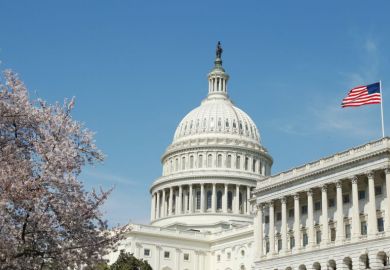The 41 per cent budget cut to the University of Alaska System announced recently by Republican governor Michael Dunleavy is just the latest in a series of attacks on US universities by the Grand Old Party.
Polling data show that since 2015, party supporters have formed increasingly negative opinions about higher education. In 2010, 58 per cent of Republican respondents told the Pew Research Center that colleges and universities have a positive “effect on the way things are going in the country”. That figure slipped to 54 per cent in 2015, and then plummeted to 36 per cent in 2017. In that year, 58 per cent of Republican respondents said that colleges and universities have a negative effect – while 72 per cent of Democrats believed that they have a positive one.
Accordingly, Republican officials have launched aggressive interventions in the operations of US universities. As well as funding cuts, they have also used legal recourses. In March, for instance, President Trump signed an executive order directing federal officials to “take appropriate steps…to ensure institutions that receive Federal research or education grants promote free inquiry”. In essence, this amounts to a threat to withhold funds from institutions that fail to support a particular concept of “free speech” (a concept apparently compatible with what, in a June tweet, Trump described as “a strong BAN on burning our American Flag”).
Republicans have also intervened numerous times in the governance of universities, with new laws related, among other topics, to tenure, the treatment of undocumented immigrant students, the use of state funds for disfavoured programmes and the composition of university governing boards. Indeed, Trump’s executive order came amid a barrage of state-level legislation related to campus speech, mostly based on model bills circulated by conservative advocacy organisations. Laws concerning how public universities may regulate speech have been adopted by Arizona, Colorado, Georgia, Missouri, North Carolina, Tennessee, Utah and Virginia.
Kentucky adopted a law in 2018 weakening faculty tenure protections, and public universities in Wisconsin weakened their own protections in 2016 in response to legislative pressure. Bills that would weaken or even abolish tenure have been introduced recently in Iowa, Kansas and Missouri. Meanwhile, states enacting laws requiring public universities to allow guns on campus in at least some circumstances include Arkansas, Georgia, Idaho, Texas and Utah. In June, Texas enacted a law creating criminal penalties for university employees who mishandle reports of sexual harassment or misconduct.
The federal government has also shown hostility toward higher education. The Tax Cuts and Jobs Act of 2017 included a tax on large university endowments, and earlier drafts would have taxed graduate student tuition waivers while repealing the student loan interest deduction.
Given how conservative media report on US university life – with Fox News exemplifying the depiction of campuses as centres of liberal indoctrination — reversing the trend of Republican opinion will be difficult. Yet universities must commit themselves to improving their image.
I propose two fronts for this public relations campaign. The teachers who educate our children in primary and secondary school, the dentists who fix our teeth, and the doctors and nurses who staff our hospitals all trained at universities. Our research keeps planes in the air, promotes medical breakthroughs and helps farmers respond to climate change. The Presidential Engagement Fellows programme at the University of Missouri System shows how universities can highlight such impacts on broader communities by sending faculty to give talks across the state, literally meeting citizens where they live. I would go further and would include public engagement as a criterion in promotion and salary decisions.
But students can serve as institutional ambassadors at least as effectively as faculty members can. Returning home during academic breaks, they can present at high schools and civic groups, allowing community members to see how their neighbours are acquiring useful knowledge. Programmes arranging such presentations will boost institutional reputations, give students public speaking experience and help them make professional connections.
The second front is for universities to make appropriate changes in response to legitimate criticism. While some attacks on higher education are misguided, it is difficult to dismiss critics of skyrocketing tuition fees and ever-increasing student indebtedness. Academic leaders should do everything in their power to stall rising tuition costs.
Further, institutions of higher education, along with the associations that support them, should press relentlessly for political solutions to the debt crisis. The federal government has immense power to affect the student loan market, and advocates for higher education should remain vigilant for opportunities to improve the financial prospects of borrowers.
Public and political suspicion of higher education is likely the “new normal” for American academia, and administrators and trustees must learn to navigate this new political landscape, particularly at public institutions in states with conservative electorates. But if universities of all kinds and in all states work to improve the overall image of higher education, huge budget cuts will hopefully remain the exception rather than the rule.
Ben Trachtenberg is associate professor of law at the University of Missouri. This article is based on a paper, “The People v. Their Universities”, forthcoming in the Kentucky Law Journal.
Register to continue
Why register?
- Registration is free and only takes a moment
- Once registered, you can read 3 articles a month
- Sign up for our newsletter
Subscribe
Or subscribe for unlimited access to:
- Unlimited access to news, views, insights & reviews
- Digital editions
- Digital access to THE’s university and college rankings analysis
Already registered or a current subscriber?








